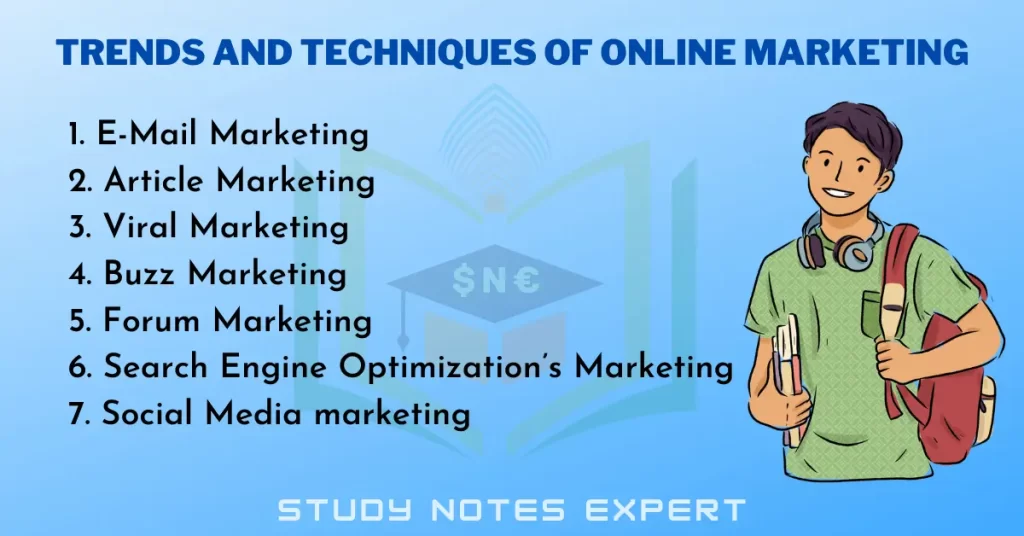The use of the internet has drastically changed the way marketers deal with their customers as well as the customer’s perceptions. In this article, we will discuss the trends and techniques of online marketing. Online marketing is a process of promoting products and services over the internet. It is the latest form of direct marketing, also known as internet/ interactive/virtual/online marketing or e-marketing.
Internet marketing has established an advanced way for marketers to create value and enhance customer relationships. The Internet connects customers to all types of marketers globally, providing a huge pool of information. This has largely altered customers’ perception of convenience, price, product information, time, and services.
Trends and Techniques of Online Marketing

The different techniques or methods of online marketing are explained as follows:
1. E-Mail Marketing
Sending advertisements, promotional brochures, or commercial messages via e-mail is termed e-mail marketing. There are several people online, and the are increasing substantially every year. They mainly use the internet for sending and receiving messages through e-mails. This is why marketing communicators are adopting e-mail marketing for advertising purposes. These e-mail messages can be designed in different ways, i.e., only text documents, graphical brochures, or documents attached with audio-visual messages.
2. Article Marketing
In internet promotion, a company or an individual writes an article about a specific industry, such as fashion, cinema, food, etc. Then, these pieces are distributed in the marketplace or published on numerous websites. It is one of the techniques of online marketing. Every article has a bio box or byline for business that lists the author’s references or contacts. A well-written article can bring in more customers and enhance the company’s credibility.
3. Viral Marketing
These are internet-based marketing strategies using blogs, websites, or social networking sites to advertise new goods and services. Viral marketing primarily aims to generate word-of-mouth and media attention by sharing remarkable stories. The cost of this marketing campaign frequently exceeds the predicted advertising budget for the company.
4. Buzz Marketing
Buzz marketing is similar to viral marketing, promoting new products and services. The only difference between both is that in buzz marketing, the advertising content is much more limited than that of viral marketing. It aims to create a buzz or publicize an upcoming product before its launch. This pre-launch buzz of the products creates curiosity. It induces the customers to know more about the product and ultimately influences them to purchase it.
5. Forum Marketing
Forum is a common place where people worldwide assemble and discuss their issues, plans, and strategies. Likewise, there are several forums on the web where people join and participate in a common discussion. Marketers use forum marketing because it is a good source of attracting many people in one place. Generally, SEO marketing is used by companies to access qualitative websites through search engines.
6. Search Engine Optimization’s Marketing
According to the interactive advertising community, a company’s presence on Google is significant. But simply registering on Google is only enough once SEO is enabled.
7. Social Media marketing
This is the most recent tool marketers employ to promote goods that consumers have received well. Twitter, Facebook, Linked In, and other well-known social media platforms are just a few. Users frequently use these websites to socialize and keep in touch with their families—friends, family, and coworkers.
What are the Different Types of Online Marketing?
Online advertising features a huge range of techniques and techniques to promote merchandise, offerings, or manufacturers thru digital channels. Here are a few key sorts of online marketing:
1. Search Engine Marketing (SEM): It entails selling websites by growing their visibility in seek engine consequences through paid advertising and marketing.
2. Social Media Marketing (SMM): This type of advertising uses social media structures like Facebook, Instagram, and Twitter to attain and interact with the target audience.
3. Content Marketing: It specializes in developing and distributing treasured, applicable, and constant content material to draw and maintain a particular target market.
How can Social Media Marketing Benefit Businesses?
Social media advertising has emerged as a vital part of group online marketing strategies. It gives several benefits regarding brand building, client engagement, and lead era.
1. Increased brand consciousness: Social media structures offer an opportunity to reach a broad target audience, growing brand visibility and recognition.
2. Direct patron engagement: Businesses can interact with their clients without delay through social media platforms, responding to inquiries and remarks and building robust relationships.
3. Lead technology and income: Social media advertising can force visitors to a website, ensuing in lead generation and capacity sales.
What is Search Engine Optimization (SEO)?
Search Engine Optimization (search engine optimization) is optimizing a website or net page to improve its visibility and ranking in search engine consequences pages (SERPs). It involves diverse strategies and strategies to enhance the organic (non-paid) site visitors to a website.

